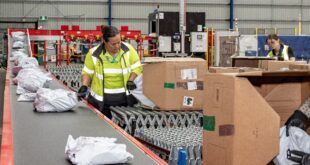Belfast-based UK ISP Fibrus, which is deploying a new Fibre-to-the-Premises (FTTP) broadband network across Northern Ireland, have embarrassingly had to inform some of their customers in the South Down constituency that their speeds will need to be significantly downgraded due to a lack of network capacity.
The timing of the current problem really couldn’t be much worse, since it follows only a few weeks after the Northern Ireland Executive formally confirmed that Fibrus had been selected to deliver Project Stratum (here), which will see £350m invested to bring “full fibre” broadband to more than 76,000 extra premises across some of the hardest to reach areas (e.g. rural).
Prior to that Fibrus had already pledged £85m+ to support a commercial deployment of FTTP in Northern Ireland, which separately aimed to cover 145,000 premises by around 2024 (here). The provider has also committed to help ensure that 100% of homes in the country can access such services by the end of 2025 (here).
Unfortunately, some of the provider’s customers, mostly those in the South Down region, have recently been complaining to ISPreview.co.uk about issues of poor service quality. The most common gripes have tended to centre around slow speeds and high (slow) latency times.
A Lack of Network Capacity
Fibrus finally acknowledged these issues in late November, with a more recent letter to customers – seen by ISPreview.co.uk – pointing the finger of blame squarely at “higher than anticipated” demand for their services. As a result, the provider said they “weren’t fully prepared for the demand on our core network” and have pledged to make “further significant investment to upgrade our network capacity so this doesn’t happen again“.
The bad news is that, with Christmas fast approaching, this additional capacity “will not be in place before the New Year” and as a result they’ve had to take some rather surprising action in order to ensure they can cater for all of their customers. As such, until the new capacity is in place, they intend to “temporarily downgrade” the packages that customers take (e.g. if you have 300Mbps then you’ll be put on 100Mbps instead).
The downgrade is expected to be completed by the end of this week and as compensation Fibrus have decided to give those affected a free service (from their next bill) until the problem is resolved, which will no doubt be very welcome, albeit still somewhat bitter-sweet.
Dominic Kearns, Fibrus CEO, told ISPreview.co.uk:
“The demand for our services and increased bandwidth packages in South Down has completely blown us away. We have put our hands up and said to our customers that given this demand, we simply didn’t have enough capacity in our new network to cope with it. Although staged upgrades in capacity were planned for these areas next year, we have had to accelerate that investment programme in response to the demand.
As a result all our customers in the affected towns are getting their service free of charge until we have the additional capacity in place. We have also balanced all our customers on a single bandwidth package to ensure that everyone has a functional service.
The industry across the board is now seeing the knock on impact of increased demand on our networks from COVID with people being at home more than usual. Standard capacity modelling for all operators is now out the window. All our current and future build areas are now being delivered on our newly built backhaul network that has significant capacity available for our customers.
We have taken full ownership of this issue and continuing to put our customers first is our main focus.”
So far as we can recall this is the first time that an FTTP broadband ISP in the UK has ever had to forcibly downgrade the package speed they supply to customers. The failure to provision enough capacity for their network to cope with demand is, however, a problem that does occasionally crop-up via other providers in this market too (it tends to be more of a problem with cheaper consumer ISPs), even if they don’t always admit it publicly.
The challenge for Fibrus now will be in ensuring that this really “doesn’t happen again,” which in an aggressively competitive market can sometimes be a difficult promise to keep. This also goes to show that slow speeds can still become a big problem, even for full fibre networks where the cable itself is no longer an obstacle for performance.
We do have to credit Fibrus though for being open and honest about the situation, which is sadly all too uncommon in this market.
Source link



